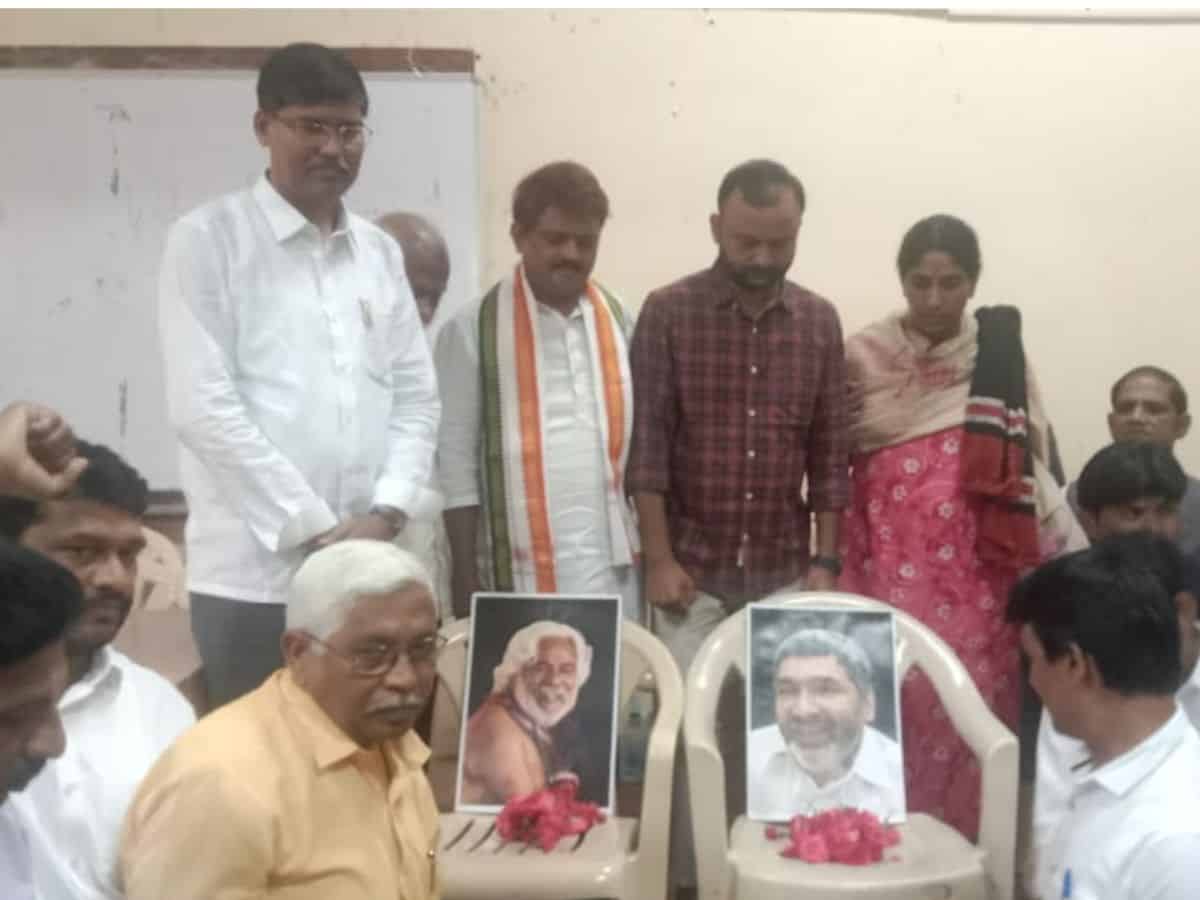
Hyderabad: The close friends in life, whom even death couldn’t separate. That was the relationship between Balladeer Gaddar and former managing director of Siasat.com Zaheer Ali Khan, who had sacrificed their lives in the service of the marginalised sections of the society. Their selfless work was greatly praised on the first anniversary of their demise during a memorial event held at Osmania University Arts College on Wednesday, August 7.
“During the last procession of Gaddar Anna from LB Stadium to his residence, Zaheer Saab stood right beside the former’s mortal remains throughout the journey. Now and then he would keep reminiscing his memories with Gaddar Anna and would narrate them to us. He was already devastated due to his friend’s sudden demise and we kept telling him to sit in the car and relax for a while, but he just kept telling us to be seated,” recalled Kota Srinivas Goud, a student leader who was close to both Gaddar and Zaheer Ali Khan.
“I have no doubt in saying that it was due to a person who never cared about Gaddar, ill-treated him, and wanted to pay his respects to the departed soul at his residence. Due to the chaos that erupted after the police action when that person arrived, Zaheer Saab passed away,” Goud said. He recalled the stampede-like situation during Gaddar’s funeral procession when Zaheer Ali Khan unfortunately lost his life.
Goud recalled how Zaheer Ali Khan would encourage them to keep working for the deprived sections of society, and claimed that whether they were communist organisations, caste-based organisations, or student organisations, Khan would always support their movements from the back-end, by arranging food, printing pamphlets and other literature required to take the people’s movements forward.
“While Gaddar Anna moved the masses with his songs, Zaheer Saab would silently work with his pen and words. He hardly used to address public meetings or sit on the podium, but would encourage us by saying that our struggles were justified and the message needed to go to the people. While one worked to achieve revolution, the other worked to protect the democracy. The contribution of these two legends to the Telangana movement can never be forgotten,” Goud asserted.
Former APCLC president G Laxman, speaking on the occasion, said that had it not been for Gaddar, he wouldn’t have been alive till now.
“When I was kidnapped by a gang one night, early in the morning Gaddar stood in front of Chandrababu Naidu, the chief minister at the time, and threatened that if anything happened to me all hell would break loose,” Laxman recounted that incident.
Durgam Bhaskar, another student leader, said that despite being unwell, Gaddar would attend the public meetings and programmes of deputy chief minister Bhatti Vikramarka during the latter’s padayatra from Adilabad to Khammam covering the tribal areas before the Assembly elections.
“Though we would ask him to stay, he would tell us that he was unwell and would need to go home, only to return the next day to attend the padayatra. It now sounds strange remembering that everywhere, while addressing the people he would say that before dying he was saying the truth, that we all have to demolish the fortress of doras (referring to the BRS government),” Bhaskar recalled.
Gaddar, the literary legend of his era
Talking about how Gaddar’s upbringing and the social conditions of the day had shaped his life, Professor Kasim praised him as the ‘literary legend of his era.’
Kasim hailed Gaddar for being the first writer and poet to introduce ‘untouchable words’ into songs, and for introducing dance simultaneously into his songs during his performances.
“If Gurajada Apparao and Mahakavi Sri Sri were literary legends of their eras, why not Gaddar,” he questioned.
“Nobody can forget the Warangal Rythu Coolie Mahasabha, where Gaddar made 15 lakh audience sing along with him. He would pen the ‘intro’ and first ‘verse’ of a song in such a simple way that it can easily be picked up by anybody. And for the hardships of any character which he describes in his song, he shows where the solution the character would find, to overcome those hardships,” Kasim explained.
Kasim further highlighted Gaddar’s contribution to the Telangana statehood movement. He emphasised his efforts of forming ‘Telangana Jana Sabha’ in 1998 and ‘Telangana Praja Front’ during the last leg of the movement. “Many may not know, but Gaddar was a serious reader, a habit which started when he joined the Osmania University College of Engineering. He would walk from the hostel that was located in Moazzam Jahi Market to the college every day. To elk out a livelihood, he became a burrakatha artist and the rest is history,” he said.
He also responded to the accusations against Gaddar about abandoning his ideology, stating that he strived to keep the movement alive. “If anybody thinks that Gaddar had left his ideology, I leave it to their debates. But I want to mention that even Kondapalli Seetaramaiah, who founded the People’s War Group (PWG), had offered to join hands with TDP during former chief minister NT Rama Rao’s regime, which was opposed by Satya Murthy then. He wanted to create a situation where the movement would survive irrespective of the political situation of the time,” Kasim observed.
Demand for Journalism award to be named after ‘Zaheer Ali Khan’
The meeting passed a resolution demanding the state government announce an annual award for Journalists named after Zaheer Ali Khan. The meeting also demanded the inclusion of Balladeer Gaddar’s life story in school books, renaming Medak district after Gaddar, and installing his statue at ‘Warangal Kala Kshetram’.
Managing director, of Siasat.com Asghar Ali Khan, chief editor of the Urdu The Siasat Daily, Amer Ali Khan, Professor Kodandaram, Gaddar’s daughter Vennela and others attended the memorial meeting.



